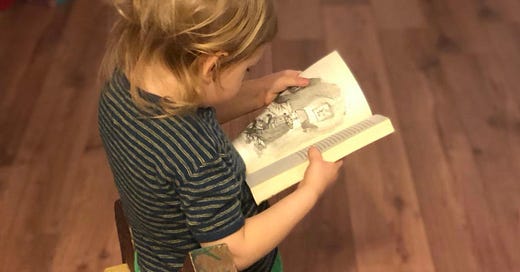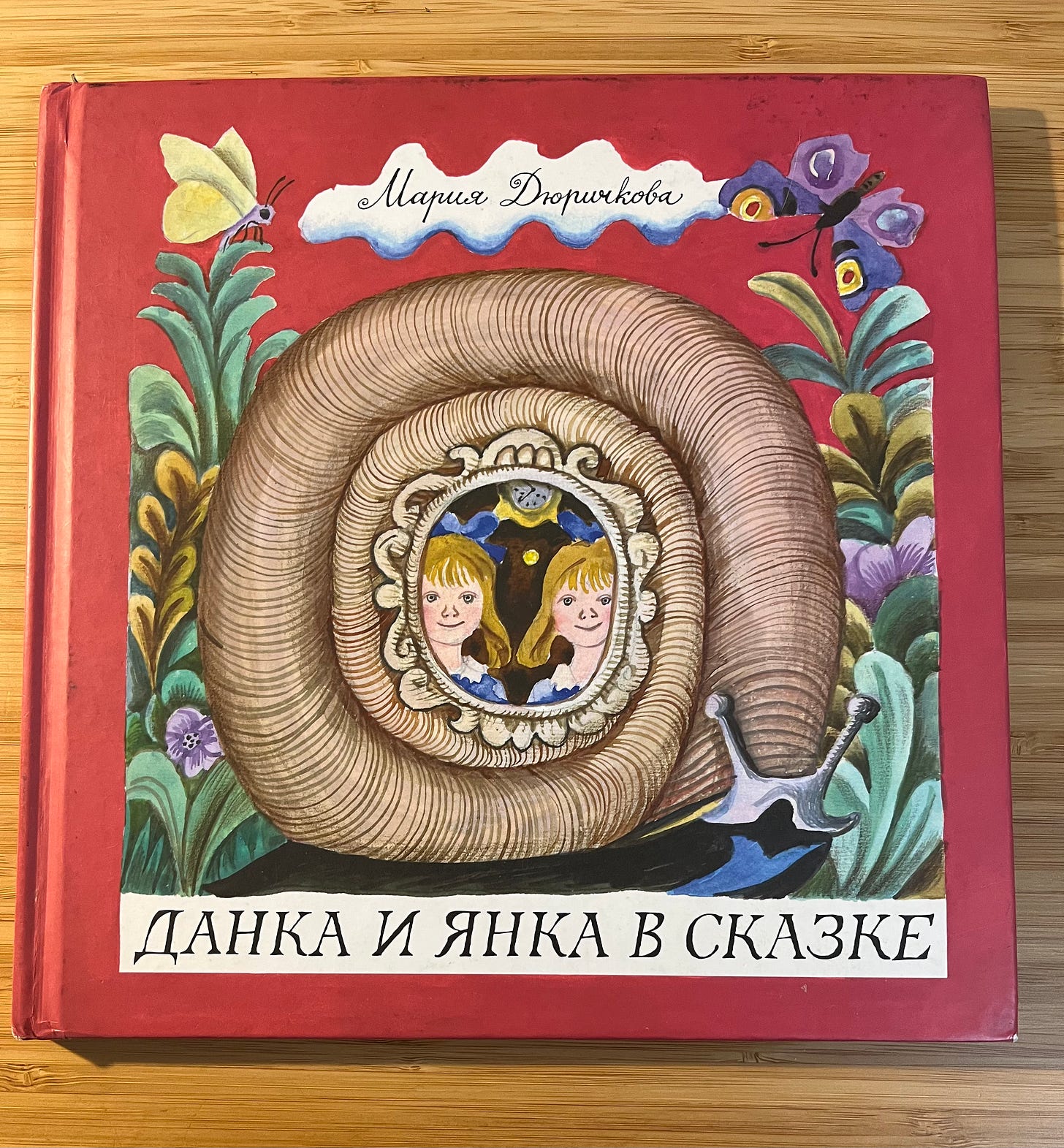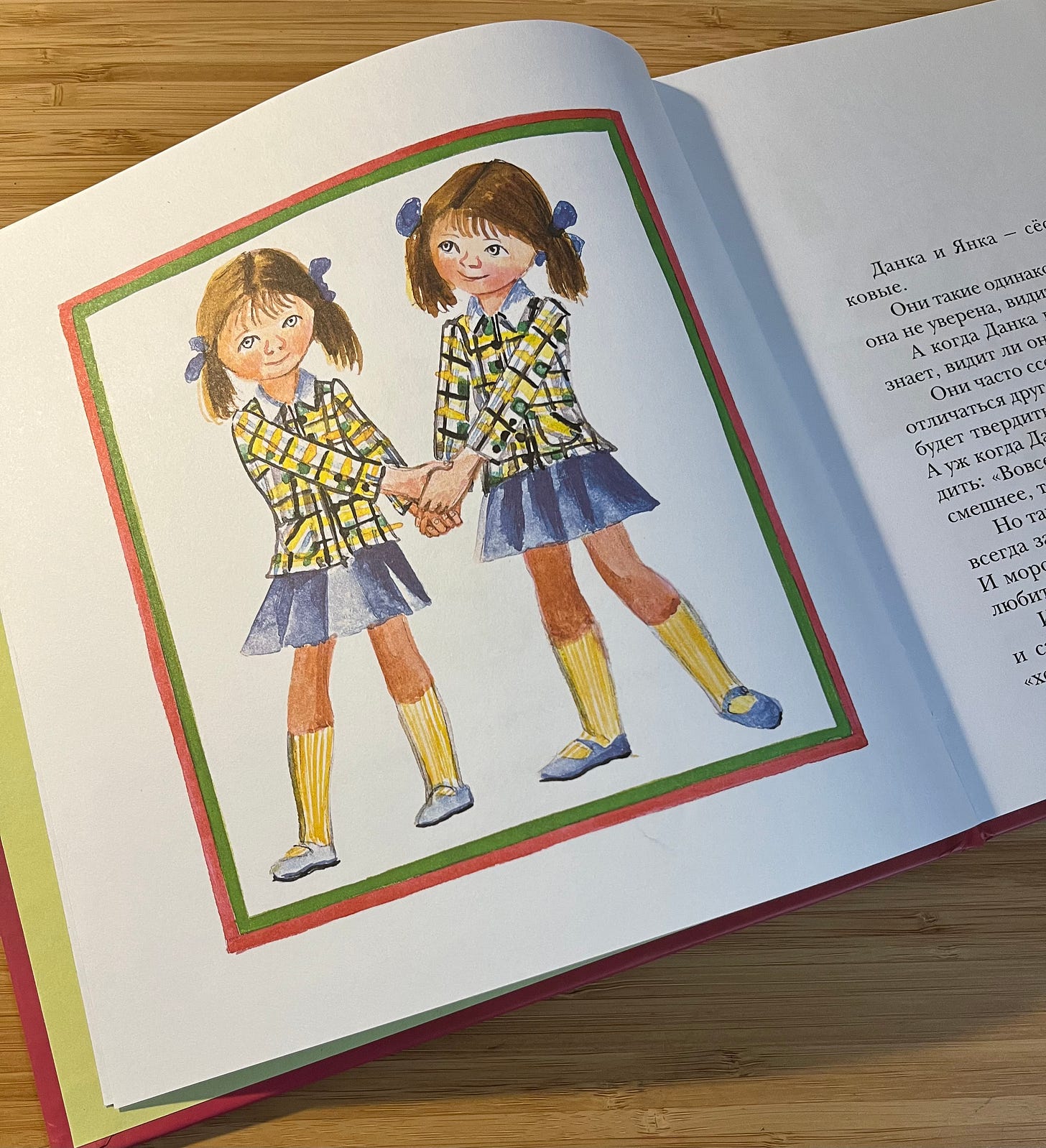My eight-year-old is sitting on her bed and pretending it’s not 9 pm on a school night:
MAYA: Repeat after me. Deshe deshe deshe deshe deshe deshe deshe arnav [in Hebrew "Grass grass grass grass grass grass rabbit"]
ME: deshe deshe deshe deshe deshe deshe deshe arnav
MAYA: Be eize tseva ha deshe? ["What color is the grass?"]
ME: Yarok ["Green"]
MAYA: Hey I said repeat after me!!!
ME: Oh. OK. [gets up to leave the room, switches to Russian:] Ladno, poydyom v dush ["OK shower time."]
MAYA: Ladno poydyom v dush.
ME: [freezes with her eyes pinned to the door. turns around. still in Russian:] Nado idti spat’ ("You have to go to bed")
MAYA: Nado idti spat'
ME: Ya lyublyu Manyushu ("I love Manyusha.")
MAYA: Ya lyublu Manyushu
ME: Manyusha parasyonok (“Manyusha is a little piggy”)
MAYA: Manyusha payasyonok
I would go on but it was bedtime now. What just happened?
I’ve been trying for three months to get her to speak Russian. I tried everything: speaking in gently coercive 20-second intervals, vinegar, baking soda — but all I achieved was to get her to say a single word here and there. She said she wanted to lose this language.
And now, all it took was a silly repeat-after-me game to get her to speak in full sentences.
My mind started spinning very fast. What does it mean that she actively refuses to speak Russian but doesn’t mind it in the context of a game?
Because it’s just pretend-speak, it’s not coming from her. Maybe we can play more games like this or maybe... maybe I can even teach her how to read in Russian! Because reading aloud is also like speaking but not as yourself.
Except that for the last couple of years she didn’t even want me to read to her in Russian. There was no chance she would want to learn to read it herself...
Still, I thought I could at least try reading to her.
I found a dusty Russian book that Maya used to love when she was little. A book about twin sisters going on adventures called Danka i Yanka (“Danka and Yanka”). It was one of my favorite books when I was a kid.
I ordered this copy online, from Russia, as soon as I became a mother.
At that time, I could spend hours combing the internet with a fine-tooth comb in search of the best books for my first baby, and the most educational, most wooden toys on the planet. All to ensure that my baby realizes his full potential.
Once, when Yannai (now 15) was about 2.5 weeks old, I made it my mission to find him a book about animals. I’d read that it was important for babies to look at photos of animals rather than cartoon drawings because this is how they learn what animals actually look like.
Reader, I spent many a sleepless night worrying that if I didn’t find the perfect book, my baby would go to university thinking that elephants looked like this:

It’s like when I hear Russian purists say “Don’t use diminutives when talking to babies because they will think that that’s how they’re supposed to speak all the time.”
Diminutives are special forms of nouns in Russian (and many other languages) that have the added meaning “little” or “cute”. So nogi means “legs” but the diminutive form nozhki means “little/cute legs.” People use a lot of diminutive when speaking to babies because, let’s face it, everything about babies is little and cute.
Some say that by doing this they endanger their babies’ future employability.
I don’t know about that. I’ve walked the planet for 42 years, and I’ve never met a single Russian-speaking adult who goes around talking about his nozhki “little legs” and ruchki “little arms” who goes to a doctor with a stomachache, and refers to his stomach as zhivotik “little belly” because he was subjected to “abuse by diminutives” as a baby.
Anyway, I am glad I bought a copy of “Danka i Yanka” all those years ago, because, unlike the book about realistic-looking elephants, both my kids actually loved it.
Maya used to love it so much that at some point I had to hide it from her.1
Now, two years later, I found it and was placing high hopes on it.
But when I offered to read it to her one night she screamed no no no no no way we’re reading “Junie B Jones” and nothing else. The same thing happened the next day, and the day after.
I was beginning to lose hope.
Until one magical day a few weeks ago she wanted to sleep in my bed and I decided that this was my golden chance.
I said "My bed my rules" (that's what I say to everyone 🙄), “One book of my choice and one book of your choice." And she had to agree.
Sometimes it helps to have a parent who’d grown up in a totalitarian regime.
That night we read half a page.
For the next few days, Maya swallowed my obligatory read-aloud in Russian like a teaspoon of fish oil... Still, I knew things were shifting.
On the third day, she emitted the habitual grumpy hmmm but forgot to pretend she was bored and falling asleep as I was reading the Russian book.
On the fourth day, she asked to see the pictures as I was reading.
On the fifth day, she asked me to clarify a word she didn’t understand in Russian…
And on the sixth day, she was going to bed later than usual and I wanted her to sleep after a chapter of “Junie B. Jones” but she said shouldn't we read the other book as well?
That’s when I knew we’d arrived somewhere.
One common challenge with bilingual kids who aren't strong in their native tongue is the lack of appropriate content. Their language is often not developed enough to consume content for kids of their age, and the content that is accessible to them is for much younger kids and is not engaging enough for them. I knew we were lucky to have narrowly avoided this problem.
She still never said a single word in Russian. When we talked about the book, I spoke Russian, and she replied in English. I didn’t mind. I was just happy that we now had a routine of reading and that she didn’t want to MURDER me anymore every time I read to her in Russian. I couldn’t ask for a bigger miracle.
But a bigger miracle did happen.
It must have been one of those nights when she was ready to do anything to delay going to sleep. When we finished reading a chapter of Danka i Yanka, she said she needed to color something urgently and can I please read her another chapter while she did that (I said no)... she said she needed to brush her doll’s hair (I said no)... she said she forgot to finish one question in her math homework (I said no).... then I guess as a last resort she grabbed the Russian book out of my hands and said: "I'm gonna read it...."
I said.... "umm.... ok?”
And she started reading. At first, it seemed like she was doing it just for laughs because many Cyrillic letters look the same as the Latin alphabet but make different sounds.... so the words came out funny and all wrong... But every time I'd tell her the right sound for each letter she’d correct herself and, it seems, started to get a kick out of getting the words right.
And oh my god somehow — I don’t know how — that became a nightly thing.
Every night now, she insists on reading a couple of lines herself. In Russian. In the language that she wanted to lose two months ago and maybe still does. Even when it takes her five full minutes to read two lines.
I don't know how this child's brain works. She still refuses to speak Russian (which is all I really want from her) but she has now taught herself to read in this language.
Raise your hand if you’ve also hidden a book from your kids because you couldn’t stomach reading it yet another night, 8 times in a row. You can email me privately if you don’t want to identify yourself.







When I first started working at my French school last year I was hesitant to read in French. I'd read one book and then my students would ask me to read the same book the next day and the next day.
The good thing about rereading the same books is that you get better but I'm sure my pronunciation was horrid. Somehow the students didn't care and enjoyed my reading nevertheless 😅
This reminds me of when my son’s nanny kept on calling dogs, “gau gau” when speaking to him in Cantonese. Cantonese is my ancestral language but I’m wholly Anglophone and we’re technically an English speaking home. However, I felt that it was important for him to be in touch with his ancestral language. The REAL word for dog is “gau,” so saying gau gau is like saying “doggy.” You just don’t after a certain age unless you’re talking to a child. The nanny thought it was just fine to use the diminutive, and sure, it’s fine, but only in Cantonese speaking homes when kids will eventually figure it out. My mom agreed with the nanny. 🙄